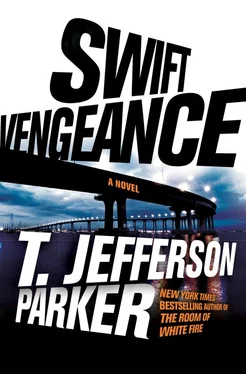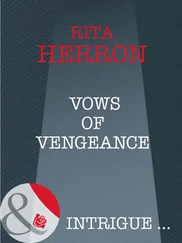I nodded, wondering exactly what these esteemed colleagues of Joan Taucher’s were looking for.
“And she allowed you to photograph Padilla’s picture with your phone, inside her JTTF office,” said Blevins. “Correct?”
“I shot pictures of the photograph.”
“With Joan’s permission?”
“She allowed me to,” I said. “So I could see what I was doing, so to speak.”
“And maybe as a thank-you for bringing her the Lindsey Rakes situation?” Blevins asked.
“I doubt that.”
“Because of the personal relationship you and Agent Taucher do not have,” said Blevins.
“Precisely.” I wondered if these fine gentlemen had bugged her office, or if Joan had already told them all this. The best thing I could think to do was to let Blevins throw his net. See where it landed.
“Now, later — this from Joan again — she told us she shared FBI lab results with you. Specifically, that the signatures on the Caliphornia threat and the Rasha Samara note were probably from two different writers. That would have been Monday night.”
While I was driving home from my stakeout of Hector Padilla, I thought. Which meant either Joan had told them about our conversation or these guys were monitoring her cell phone — probably SOP for agents’ work-issued smartphones. I looked at each of Blevins’s underlings in turn. Three faces, bland and unreadable.
I wondered, if they knew all this, why did they need my recorded corroboration? The answer hit me hard: so I could help them throw Taucher under whatever bus they had in mind. In their eyes, I was a high-value asset — a private contractor who had come forward because Joan Taucher was leaking information. Information on terror. Which made her a danger to our national security.
“She gave me the documents examiner’s opinion of the signatures,” I said. Wondering again exactly what Blevins had in mind for Joan Wayne. The Bureau. Suspicion wrapped in suspicion. Cunning wrapped in cunning. While Caliphornia moved through their defenses like a ghost.
“We’re almost done here,” said Blevins. “Just a few more questions. Now, moving along to two nights ago, Thursday, you were contacted by an officer of the Bakersfield Police Department regarding surveillance video taken at Kenny Bryce’s apartment complex. You were sent a self-destructing Telegram video. Six and a half seconds, Joan said. Did you in fact receive and view such a video?”
Again I wondered how they knew this. Her office landline? Her cell? Did it matter? Like anyone — from model citizen to terrorist — I was pleased to know that the self-destructing video had left no trace in my phone.
But I clearly remembered Joan’s words about agents handing out FBI property, and I knew what Blevins was thinking. Joan allowing me to view the Kenny Bryce video was comparable to her smuggling papers out of JTTF headquarters in her briefcase. Or a video stick in her purse. As she had said: That’s physical FBI evidence. They’d have my head.
It looked to me like they were trying to do just that. I saw no choice in what to say. “No. I’ve gotten no Mission: Impossible Telegrams.”
Three of the men sat back, as if on cue, exchanging glances, sighs. Only Lark, the young upstart, remained fixed on me.
“Think about that again,” said Blevins. “I’d like to give you the opportunity to remember correctly.”
“No. Final answer.”
“We have what we need,” he said, looking past the pond to the green hills beyond. “Is that where you guys shot down the helicopter with Briggs Spencer in it?”
“The very place.”
He nodded. The violent death of psychologist Briggs Spencer here at Rancho de los Robles had made headlines across the nation.
“Spencer was a complicated man,” said Blevins. “And part of a complicated chapter in our history.”
“I’ve heard those platitudes before.”
We stood. Blevins clicked off his recorder but he didn’t put it back into his briefcase. I walked them past the Ping-Pong table and the barbecue, toward the railroad-tie steps that lead down to the barnyard.
Silence. Sweet smell of grass in sunshine. Agents two by two, PI Ford leading the way, listening for the click of the recorder’s “on” button. Heard it just before we started down the steps. Blevins the crafty.
“You sure you didn’t see that Bakersfield surveillance video, Ford?” he asked from behind me.
“I’m very sure.”
“Lying to a federal agent is a crime.”
Zeno had left a sizable pile in our way. I stepped around it, turning as Blevins walked straight toward it. I slowed and held his look and let him continue on his course.
“Oh, shit,” he said, stopping.
Everyone else stopped, too.
“I’m sorry, Mr. Ford,” said Lark. “But may I use a restroom before we leave?”
“Christ, Mike, can’t you just hold it?” asked Blevins. His face was florid and he had both hands out for balance, sweeping one shiny cap-toe dress shoe across the slick, unhelpful barnyard grass. Raising an invisible mountain of stink.
“I can’t, sir,” said Lark. “And it looks like you might be a minute.”
I led Lark across the damp grass and into the barn, pointing out the bathroom back in the corner behind the tractor and the Bobcat. Clevenger’s worktables had their usual collection of drones and drone parts, cameras and monitors. The agent stopped and stared at them before turning to me.
“Blevins doesn’t work with us in San Diego,” he said. “He’s from Washington. Where he and his people want to transfer Joan. Where they’ll hold a pillow over her face and call it a promotion. Joan and I work together. I’ve tried warning her. I’ve tried talking to her.”
“And?”
“She doesn’t listen to me.”
“Sounds like her.”
“She’s a great agent,” Lark said. “I want to help her but I don’t know how. I’m not even sure there’s anything I can do.”
“I hope you think of something,” I said.
He looked at me for a beat, as if waiting for a suggestion. “Me, too. I’m twenty-four. The same age as Joan was when she first started here in San Diego. Just before Nine-Eleven. I was seven when I saw those planes coming down.”
The moment of silence we all know.
“God, that was funny,” said Lark.
“Nine-Eleven?”
“No. Darrel stepping in the dog shit.”
In the expected privacy of my pickup truck, I told Joan Taucher everything that had happened two hours earlier. The Saturday traffic was light and we were almost to Camp Pendleton by the time I’d finished.
Taucher sat hard-faced, looking out the windshield through aviator sunglasses, her makeup heavy and her white bangs trimmed bluntly at her brow. No hematoma in sight. Black suit with a flag lapel pin, black blouse, gun and holster temporarily on her lap for comfort. A charmless black purse on the floorboard in front of her.
“I know all about their crude tricks,” she said. “Frosts my balls. Lark’s a good kid. He tries to help me, but I see through him like a window. I don’t know about my office being miked, but I know the work phones are monitored. Randomly, they say. Policy. It just piles up in the Cloud. Metadata. Useless mountains of crap in the Cloud, generated by us. Nobody can listen to it all. Hell, we can’t even keep up with the domestic terror tips. You saw my walls. I watch what I say, wherever I am. The stuff I shared with you was small potatoes. They haven’t written me up for anything. Yet.”
“I’m surprised you take it so well.”
“And my choice is what?”
I thought about that and saw her point. I couldn’t picture Taucher doing anything other than what she was doing here and now in this city. Guarding the citadel. Tracking the ghosts. She was where she belonged. By fate, luck, or design. Blessing and curse.
Читать дальше












